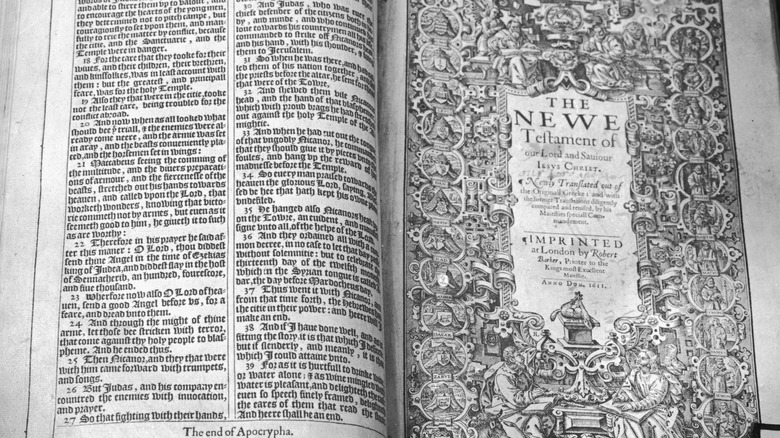Why Many Christians Prefer The King James Bible
For centuries, the Bible was inaccessible to most Christians for a variety of reasons, not the least of which was that all but the educated classes were illiterate. Even those who could read would still likely have a hard time getting their hands on one — prior to the invention of the printing press, they were painstakingly copied by hand and would have been rare and invaluable. And if you overcame those obstacles, there was the fact that the Bible was written in a foreign language that you'd have to study for years to understand. Indeed, it wasn't translated into English until the 1300s, according to Evidence For Christianity.
In 1611, the Big Daddy of English translations of the Bible came into being: the King James Bible, translated from various texts into English on orders of King James I. To this day, four centuries after its initial publication, not only is it still printed, but phrases from the text permeate the English lexicon. "Do unto others" and "Thou shalt not kill" are just a few examples.
These days, there are dozens of Bible translations available to English-speaking Christians. But for a small subset of Christians, the "King James Version" is the only way to go. Indeed, some Christians lean so heavily into the KJV that they believe that any other English translation of the text is flawed to the point of being heretical. So what's the reasoning behind this belief?
Understanding the King James Only movement
To understand the "King James Only" controversy, one must understand the history of copying the Bible from various fragments of scripture that managed to survive for centuries. To make an extremely long story short, the original pages on which the original authors wrote their words — Bible scholars call these "autographs" — are long gone. However, copies of copies of those manuscripts form the basis for the current Bible. The King James Version was translated from one set of manuscripts, while other English translations come from a different set of manuscripts.
As Trevin Wax writes (perhaps unkindly) in The Gospel Coalition, "The King James Only controversy is essentially a conspiracy theory that claims that all modern translations of Scripture are based on tainted manuscripts and that their translators are driven by a liberal Protestant or Roman Catholic (or even one-world government) agenda." There are those purists again, but Wax describes them more as fundamentalists. Wax says they have drawn their lines in the sand about the sanctity of the one true Bible, KJV.
However, self-professed KJV-only adherent Ken Matto, writing in Scion of Zion, explains why he doesn't see things that way. He points to several specific Bible verses — and the differences in translation therein — as evidence that modern translations completely mess up the meaning of the text. In fact, he believes these botched translations promote a heretical doctrine. "The serious challenges the church faces today is due to the influx of counterfeit Bible versions," he said.
There is also the matter of personal preference
The debate stems from the different ways that some versions of the Bible are translated. Some take an approach called "meaning-to-meaning," per Bible Answers. These versions are "close to the original" but use modern language. Yet another type of translation of the Bible is largely done by paraphrasing, using "free" or "loose" translations.
As Trevin Wax goes on to note via The Gospel Coalition, there are other reasons that King James Version-only adherents point to, most of which involve other arcane textual issues, which he then goes on to rebut. However, what Wax does not address is that many Christians simply prefer the KJV for no other reason than that they like it. Writing in Heart and Hand, David Murray notes that many Christians grew up in congregations that used the KJV in teaching and preaching, and they feel there's no need to buck tradition. Familiarity is comfortable.
"The language is part of their spiritual vocabulary and reminds them of many sermons they heard throughout the years," he wrote. Similarly, in the minds of some believers may exist an "us versus them" mentality. Notably, some Christians brought up in the KJV tradition believe that churches that use more modern English translations are rejecting old doctrine or are on the path to liberalism. Further, Murray notes that modern translations are filled with footnotes that point readers to textual variances, contextual clues that would help them understand the text, and similar minutiae. Murray concludes that these footnotes distract and confuse some readers and push them toward the KJV.


